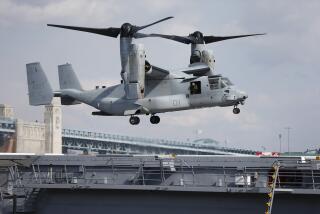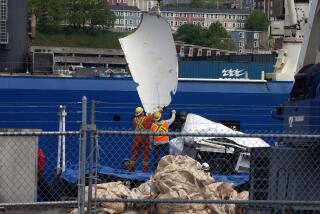House panel to examine safety on Deepwater Horizon
- Share via
Reporting from Washington — A House subcommittee will question government and oil industry officials Thursday about worker safety aboard the Deepwater Horizon oil rig the day it exploded in the Gulf of Mexico, focusing partly on worker complaints that the vessel was undermanned and had a confusing command structure.
These concerns were outlined this week in a Times story that described the rig’s registration with the Marshall Islands, a small Pacific nation that classified the vessel in such a way that a drilling manager rather than a captain was in charge of it at the time of the accident.
A top Coast Guard official, Rear Adm. Kevin Cook, will testify before the House transportation subcommittee on Coast Guard and maritime transportation and is expected to be closely questioned on Coast Guard safety and inspection requirements.
A member of the subcommittee, Rep. Gene Taylor, a Mississippi Democrat and Coast Guard veteran, has faulted his former branch of the service for allowing foreign governments and their private sector surrogates to proliferate in U.S. waters, many operating with standards that may not be endorsed by the Coast Guard.
Officials with the Marshall Islands government and Transocean Ltd., the Swiss company that operated the drilling rig, say they fulfilled all requirements of the law and met the highest industry standards and those of the U.S. Coast Guard.
If the Deepwater Horizon had been flying a U.S. flag, some maritime experts say, it probably would have been classified in such a way that a licensed captain would be in charge at all times.
In addition to the Coast Guard, members of the subcommittee will question officials from Transocean. The company and the Marshall Islands have denied taking any shortcuts in manning, management or safety.
Though the industry analysts say Marshall Islands-flagged rigs are generally well regarded, this classification has raised questions about whether Transocean sought less rigorous manning requirements, a charge the company has denied.
The Deepwater Horizon maintained its position over a well using constantly operating thruster engines governed by a satellite navigation system. A similar “dynamically positioned vessel” in the U.S. fleet, the GSF Explorer, has been classified in such a way that a licensed captain, or master, is in charge at all times.
Next week, the House Education and Labor Committee will examine some similar questions in its first hearing on the rig explosion that produced the largest oil spill in U.S. history. The committee will look into management and crew safety aboard vessels like the Deepwater Horizon, as well as risks facing workers cleaning up the spill on Gulf Coast shores.
More to Read
Sign up for Essential California
The most important California stories and recommendations in your inbox every morning.
You may occasionally receive promotional content from the Los Angeles Times.










